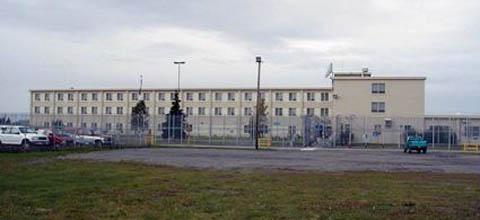
(Courtesy of the Department of Corrections)
In the year since the major criminal justice reform bill, Senate Bill 91, was signed into law, there has been plenty of debate over whether it’s working to reduce Alaska’s prison population, and the Legislature is reconvening to consider changes to the bill. But as lawmakers decide whether to tweak criminal justice reform, an organization is forming on the Kenai Peninsula that also hopes to reduce the number of Alaskans ending up back in jail.
When someone leaves the Kenai Peninsula’s two state correctional facilities, they may be re-entering the community without a support system. They might not even know what the first step in rebuilding their life is.
“A lot of times people coming out of incarceration, you open the gates and it’s like opening the screen door for a two-year-old,” Audrey Cucullu explained. She’s the executive coordinator for the Kenai Reentry Coalition. “We don’t really know what to do, like, ‘Ok, what do I do now?’ Because a lot of times people just know how to survive.”
The coalition got its start a little over a year ago. With about $150,000 in funding and help from about 20 agencies and organizations, the group is setting up shop in a Peninsula Community Health Services building in Kenai.
The idea is for the coalition to be that first step outside of prison doors, a one-stop shop for anything someone might need to get a foothold in their community, from parenting classes to dental care.
The coalition won’t directly be providing these services, but it will streamline what’s available and potentially spark additional help. Jodi Stewart is the probation liaison with the coalition and a Department of Corrections employee.
“Some people need help with employment. Others need help with getting just the basic things met like food, shelter. Others need just an extra person to call when they don’t know what to do next,” Stewart explained.
Both Cucullu and Stewart say the need for these services is high on the peninsula and around the state. According to the Department of Corrections, about 70 percent of people leaving prison in Alaska will end up behind bars again. Stewart added that the probability for children of incarcerated parents winding up in jail also sits around 70 percent.
Other communities around the state have been working to reduce that statistic. Juneau, the Mat-Su, Fairbanks and Anchorage all have re-entry coalitions, but are they working?
Devon Urquhart is the coalition coordinator in Anchorage, and she says they’re working on that answer. All four groups receive some funding from the state to hire case managers that meet with prisoners three months before they get out in order to get them lined up with services.
All four groups receive some funding from the state to hire case managers that meet with prisoners three months before they get out.
“Each returning citizen has a plan that the case manager works with them on to make sure they have housing, to make sure they have employment and that their connected to the right treatment and wellness resources,” Urquhart explained.
Case managers continue working with clients for another six months after their release and can handle about 40 cases at a time. The coalitions started getting referrals from correctional facilities back in May.
The state is tracking those clients through a database to see how many return to prison, essentially measuring the recidivism within the program. That could mean measurable success for the coalitions to point to after the first round of clients complete the program in early 2018.
“If this works and we’re seeing the kind of results that we need to see and we want to see, it means everything to us,” Urquhart said. “Our communities are safer. People are connected to their families. We have healthy returning citizens.”
The Kenai Peninsula coalition plans to use that same system eventually, but they want to get some services off the ground first.
“It’s going to be a rollout. Right now, we’re working on peer support services because with peer support services, we can get people better connected with the services that actually already exist in all of the communities,” Cucullu explained. “That might mean somebody needs a ride to get a driver’s license, or to get to treatment, or to get their assessment done.”
Coalition partner Peninsula Community Health Services is working to hire four peer support professionals by the end of October.
The coalition has also held community meetings on the central peninsula and in Homer to find out where there are gaps in services. It has additional meetings planed in Seward and Ninilchik over the next two months. The coalition hopes to open its doors officially in January.




